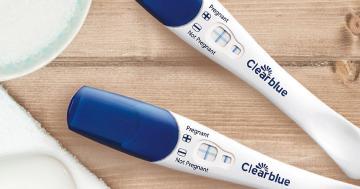How many pregnancy tests should you take?

It’s a common scene in television shows and movies: A woman takes a pregnancy test, sees the result and then, in excitement or disbelief, takes two more. In reality, taking a second test immediately following the first is often unnecessary. Let’s look at how many pregnancy tests you should take, and what to do if you get mixed pregnancy test results.
In this article
- How many pregnancy tests should I take?
- What should I do if I took two pregnancy tests and got different results?
- How long should you wait between pregnancy tests?
- My pregnancy test was negative. How can I be sure the result is correct?
- I see a faint line on my pregnancy test. Should I test again to be sure it’s positive?
How many pregnancy tests should I take?
To answer this question, it’s important to first understand how pregnancy tests work. Home pregnancy tests detect human chorionic gonadotropin (hCG), a hormone produced during pregnancy. When a fertilised egg implants into your uterine wall, the placenta begins to grow, releasing hCG into your bloodstream.1,2 Some home pregnancy tests can detect hCG in your urine six days before your missed period — but not before. So, if you take a pregnancy test the morning after you have sex, that’s too early to get a result!
Read your tests instruction leaflet to determine when you should test. If you test before your expected period and get a negative result, you may have miscalculated your menstrual cycle length, or the level of hCG in your urine may be too low to detect. You also might not be pregnant. You should test again when your period is due. If the result is still negative, but your period hasn’t started, you should see your healthcare provider. The Clearblue® Ultra Early Pregnancy Test can detect 79% of pregnancies six days before your missed period (five days before your expected period).
When deciding how many pregnancy tests to take, keep two things in mind: All Clearblue tests are over 99% accurate from the day you expect your period,5 and false positives are rare. So, if you take a test on or after the day you expect your period and get a positive result, you can be sure of the result. If you get a negative result, you may have miscalculated the day your period is due. Test again in three days’ time if your period has still not arrived. If this test is also negative, see your doctor.
What should I do if I took two pregnancy tests and got different results?
It’s possible to get a negative pregnancy test result followed by a positive result, especially if you tested early. This is because hCG levels rise rapidly in the first few days after implantation.
It’s also possible to get a positive test result followed by a negative result. If you use two different pregnancy tests, this could be the result of varying test sensitivity. Wait a few days and test again.
You also may no longer be pregnant. This is called early pregnancy loss, which is not uncommon, affecting around one in four pregnancies. It is often difficult and heartbreaking, though most women can go on to have a healthy pregnancy afterwards. If you think you’re experiencing an early pregnancy loss, talk to your healthcare provider as soon as possible. Know that repeated pregnancy loss is uncommon.3
How long should you wait between pregnancy tests?
You should take another test if:
- You used an expired test.
- You drank an excessive amount of fluids before you took the first test.
- You think you may have used the test incorrectly or got a test error.
You may want to take another test in three days’ time if:
- You have not had your period or a positive pregnancy test result.
- You’re not sure if you calculated your menstrual cycle correctly.
- You tested early.
My pregnancy test was negative. How can I be sure the result is correct?
You may not be pregnant or the level of pregnancy hormone may not yet be high enough to be detected. Test again in three days’ time. If this test gives you a “Not Pregnant” result and your period is late, see your doctor.
I see a faint line on my pregnancy test. Should I test again to be sure it’s positive?
Remember: All Clearblue tests are over 99% accurate from the day you expect your period.5 If you see a test line in addition to a control line on your pregnancy test — no matter how faint it is — your result is “pregnant” and you don’t need to test again. This is because pregnancy tests work by detecting levels of the pregnancy hormone hCG, which is normally only present if you’re pregnant.
Some recent studies have explored phenomena such as “phantom hCG,” in which a patient tests positive for hCG when they are not pregnant. However, these scenarios are extremely rare.3
When using Clearblue tests, faint result lines can occur if:
- Your hCG levels aren’t very high due to testing early.
- You drank too much liquid before testing.
- You didn’t test first thing in the morning (if testing early).
If you’re worried about faint lines, consider taking the Clearblue Digital Ultra Early Pregnancy Test which provides clear digital results in words: “Pregnant” or “Not Pregnant.”
It can be tempting to take multiple pregnancy tests to confirm a result, or to try to get a different one. But here’s the bottom line: If the test hasn’t expired, if you followed the instructions carefully, and you haven’t miscalculated your menstrual cycle length, your Clearblue pregnancy test is over 99% accurate at detecting pregnancy from the day you expect your period.5 If you get a negative result and your period has still not arrived, test again in three days’ time. If this test is also negative and your period still has not arrived, see your doctor.
Sources and Disclaimers
- Healthwise, “Human Chorionic Gonadotropin (HCG),” (Oct. 8, 2020), University of Michigan Health, Michigan Medicine, https://www.uofmhealth.org/health-library/hw42062
- “What is HCG?” (n.d.), American Pregnancy Association, https://americanpregnancy.org/getting-pregnant/hcg-levels/.
- “Early Pregnancy Loss,” The American College of Obstetricians and Gynecologists, last reviewed Feb 2020 https://www.acog.org/womens-health/faqs/early-pregnancy-loss.
- Oyatogun, O., Sandhu, M., Barata-Kirby, S., Tuller, E., & Schust, D. J. (2021). “A rational diagnostic approach to the ‘phantom hCG’ and other clinical scenarios in which a patient is thought to be pregnant but is not,” Therapeutic Advances in Reproductive Health, https://doi.org/10.1177/26334941211016412.
- >99% accurate at detecting typical pregnancy hormone levels. Note that hormone levels vary. See insert.

What are the early signs of pregnancy?
There are various symptoms that can indicate you might be pregnant, even if you might not experience any/all of them.

How to use a pregnancy test
When and how you can test depends on the test you use, but in this article you will find everything you need to know before starting a test.

Accuracy when you need it most
No brand is more accurate: our Pregnancy Tests are over 99% accurate from the day you expect your period, for confidence when you need it most.




